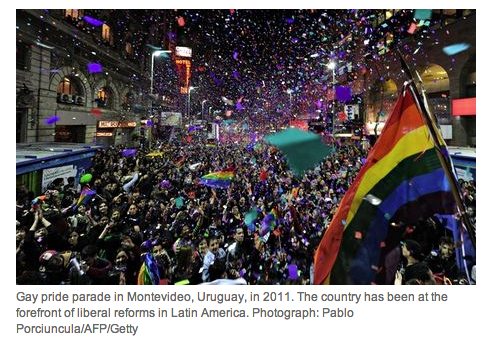From legalising abortion to transsexual rights, marginalised groups have united to become a formidable force for change
One tiny country has been blazing a liberal trail across Latin America. In the past six years, Uruguay has introduced ground-breaking legislation on abortion, drugs, transsexual rights, and same-sex marriage and adoption.
While President José “Pepe” Mujica and his centre-left Broad Front coalition have been making international headlines for their sweeping reforms – which led to Uruguay being crowned country of the year by the Economist magazine in 2013 – less well known is that up to 3,000 civil society activists have been the driving force behind the country’s extreme makeover.
“Just 10 years ago, these laws would have been unthinkable,” Michelle Suárez, a member of the lesbian, gay, bisexual and transgender (LGBT) group Ovejas Negras, or Black Sheep, said when the legislation was passed. Suárez, the country’s first transgender law graduate, drafted the proposal for the equal marriage bill passed by parliament last year and worked on legislation that granted equal adoption rights to same-sex couples in 2009.
When Broad Front won the election in 2004, its manifesto showed little sign of such an approach. “This [liberal] agenda has been conceived by social movements systematically alienated from political power,” says Lilian Celiberti, a teacher and member of Cotidiano Mujer, which campaigns for gender equality.
In recent decades, there has been a more collaborative approach to social activism in Uruguay. Formerly disparate organisations representing women, young people, students and LGBT citizens have been joining forces to reach a wider audience and gain political influence.

